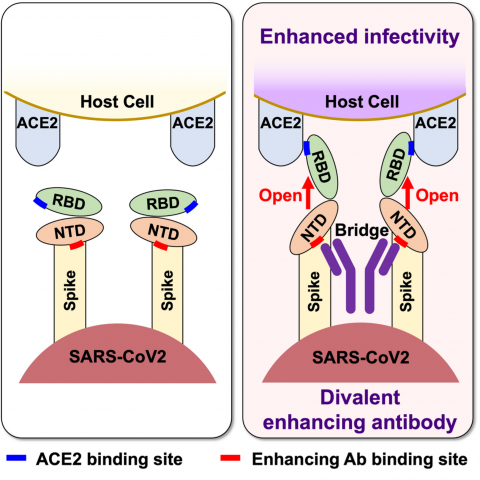![]()
ACHIEVEMENTSIPR The University of Osaka
-

- ACHIEVEMENTS
- Antibodies that enhance the SARS-CoV-2 infection
Press Release
2021.05.25
Antibodies that enhance the SARS-CoV-2 infection

SARS-CoV-2 infectivity is enhanced upon antibody binding to NTD. (Liu Y. et al., Cell 2021) |
A research group led by Professor Hisashi Arase at Osaka University find that infection with SARS-CoV-2 produces not only neutralizing antibodies that prevent infection, but also antibodies that enhance infection (infection-enhancing antibodies)
A research group from Osaka University led by Professor Hisashi Arase and consisting of researchers from the Research Institute for Microbial Diseases, the Institute for Protein Research, Immunology Frontier Research Center, the Center for Infectious Diseases, and the Graduate School of Medicine has discovered for the first time that both neutralizing antibodies that protect against infection as well as infection-enhancing antibodies that increase infectivity are produced after infection with SARS-CoV-2 by analyzing antibodies derived from COVID-19 patients.
Antibodies against the receptor binding site (RBD*1) of the SARS-CoV-2 spike protein play an important function as neutralizing antibodies that suppress SARS-CoV-2 infection by inhibiting its binding to the human receptor, ACE2*2. On the other hand, the function of antibodies against other sites of the spike protein was unknown.
“We found that when infection-enhancing antibodies bind to a specific site on the spike protein of SARS-CoV-2, the antibodies directly cause a conformational change in the spike protein, resulting in the increased infectivity of SARS-CoV-2. Neutralizing antibodies recognize the RBD, whereas infection-enhancing antibodies recognize specific sites of the N-terminal domain (NTD*3),” explains Professor Hisashi Arase. “Furthermore, the production of infection-enhancing antibodies attenuated the ability of neutralizing antibodies to prevent infection.”
Higher production of infection-enhancing antibodies was found in patients with severe COVID-19. It was also found that non-infected individuals may have small amounts of infection-enhancing antibodies.
Although the production of infection-enhancing antibodies may be involved in the development of severe disease, further analysis is required to ascertain whether they are actually involved in the exacerbation of infection in the body.
By analyzing the antibody titer of infection-enhancing antibodies, it may be possible to check for people who are prone to severe disease. The results of this research are also important for the development of vaccines that do not induce the production of infection-enhancing antibodies.
“It is important to analyze not only neutralizing antibodies but also infection-enhancing antibodies. In the future, it may be necessary to develop vaccines that do not induce the production of infection-enhancing antibodies, because infection-enhancing antibodies may be more effective against mutant strains in which neutralizing antibodies are not sufficiently effective,” says Professor Hisashi Arase.
Word explanation
*1: RBD (Receptor Binding Domain)
Receptor Binding Domain of SARS-CoV-2 spike protein binds to ACE2.Closed RBD does not bind to ACE2 but open form of RBD preferentially binds to ACE2. The infectivity enhancing antibodies induce open form of RBD.
*2: ACE2
Host cell surface receptor for SARS-CoV-2
*3: NTD (N-Terminal Domain)
N-Terminal Domain is located at N-terminus of spike protein but the function of NTD is not well known.


